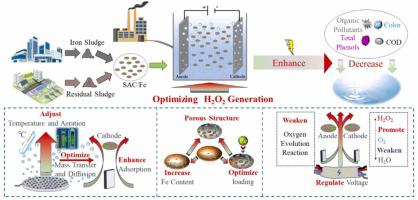当前位置:
X-MOL 学术
›
J. Environ. Chem. Eng.
›
论文详情
Our official English website, www.x-mol.net, welcomes your
feedback! (Note: you will need to create a separate account there.)
Enhancing the treatment efficiency of three-dimensional electro-Fenton system for organic wastewater: An analysis from the comprehensive perspective of H2O2 generation
Journal of Environmental Chemical Engineering ( IF 7.4 ) Pub Date : 2024-04-01 , DOI: 10.1016/j.jece.2024.112666 Jiping Tang , Baolin Hou , Jinyue Liu , Renjian Deng , Chuang Wang , Zhi Li , Yong Jiao
Journal of Environmental Chemical Engineering ( IF 7.4 ) Pub Date : 2024-04-01 , DOI: 10.1016/j.jece.2024.112666 Jiping Tang , Baolin Hou , Jinyue Liu , Renjian Deng , Chuang Wang , Zhi Li , Yong Jiao

|
For optimizing H2 O2 generation in three-dimensional electro-Fenton (3D-EF) to enhance efficacy in treating organic wastewater, a comprehensive analysis from various perspectives of H2 O2 generation was provided. By quantifying the generation of H2 O2 within the reaction system and comparing it with the changing trends in organic wastewater treatment efficiency, a close correlation between H2 O2 generation and organic wastewater treatment was revealed. A reliable and accurate kinetic model for H2 O2 generation was formulated by building upon the reactions of H2 O2 with electrodes and coexisting substances. The mathematical formulation of the kinetic model pinpointed pivotal factors influencing H2 O2 generation, including current density, dissolved oxygen concentration, and the Fe catalytic activity substance. The experimental data and fitted results under various conditions indicated that the model could reasonably and accurately describe the relationship between pivotal factors and the quantity of generated H2 O2 . Crucial strategies were proposed to enhance H2 O2 generation in the 3D-EF system by drawing from the impact rules of pivotal factors on H2 O2 generation. These strategies primarily focused on improving electrode performance, optimizing reactor conditions, and refining particle electrode preparation processes.
中文翻译:

提高有机废水三维电Fenton 系统处理效率——基于H2O2生成综合视角的分析
为了优化三维电芬顿 (3D-EF) 中 H2O2 的生成以提高处理有机废水的效率,从不同角度对 H2O2 生成进行了综合分析。通过量化反应系统内 H2O2 的产生并将其与有机废水处理效率的变化趋势进行比较,揭示了 H2O2 生成与有机废水处理之间的密切相关性。通过 H2O2 与电极和共存物质的反应,建立了可靠且准确的 H2O2 生成动力学模型。动力学模型的数学公式确定了影响 H 2 O 2 生成的关键因素,包括电流密度、溶解氧浓度和 Fe 催化活性物质。不同条件下的实验数据和拟合结果表明,该模型能够合理、准确地描述关键因素与H2O2生成量之间的关系。通过借鉴关键因素对 H2O2 生成的影响规律,提出了增强 3D-EF 系统中 H2O2 生成的关键策略。这些策略主要集中在提高电极性能、优化反应器条件和改进颗粒电极制备工艺上。
更新日期:2024-04-01
中文翻译:

提高有机废水三维电Fenton 系统处理效率——基于H2O2生成综合视角的分析
为了优化三维电芬顿 (3D-EF) 中 H2O2 的生成以提高处理有机废水的效率,从不同角度对 H2O2 生成进行了综合分析。通过量化反应系统内 H2O2 的产生并将其与有机废水处理效率的变化趋势进行比较,揭示了 H2O2 生成与有机废水处理之间的密切相关性。通过 H2O2 与电极和共存物质的反应,建立了可靠且准确的 H2O2 生成动力学模型。动力学模型的数学公式确定了影响 H 2 O 2 生成的关键因素,包括电流密度、溶解氧浓度和 Fe 催化活性物质。不同条件下的实验数据和拟合结果表明,该模型能够合理、准确地描述关键因素与H2O2生成量之间的关系。通过借鉴关键因素对 H2O2 生成的影响规律,提出了增强 3D-EF 系统中 H2O2 生成的关键策略。这些策略主要集中在提高电极性能、优化反应器条件和改进颗粒电极制备工艺上。

































 京公网安备 11010802027423号
京公网安备 11010802027423号